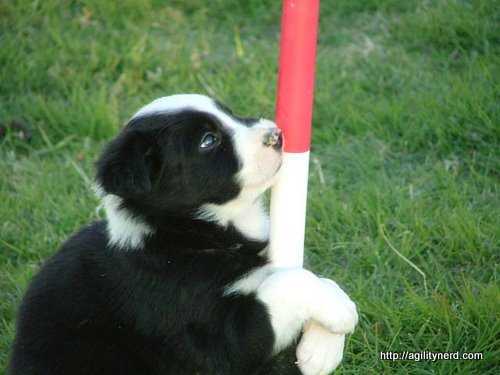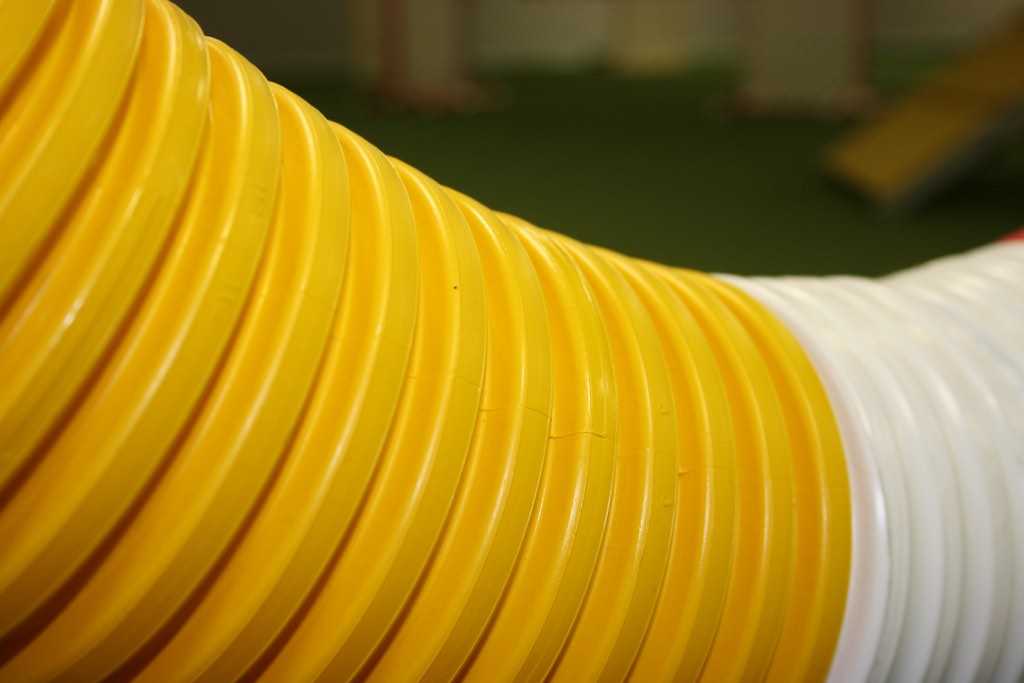More Thoughts on Goals and Success
04 Jun 2014
Five years ago I wrote an article on goals and success and I’m revisiting the subject on today’s Dog Agility Action Day on Success along with dozens of other Dog Agility Bloggers. So how do I choose my goals and measure our success against them?
Why Do You Do Agility?
I think this is an important question for each of us to ask ourselves. For me the answer is, I feel great when we meet the challenge of the course. It takes us being perfectly in sync and “in the moment” to make it happen and when it does it is a wonderful feeling. I also like to push my handling and use our skills to do our very best on course. So I don’t want to just qualify; I want to meet the challenge and do it as fast as we can.
Trialing/Competition
When I first started in agility I always got grief from instructors and classmates for my philosophy of “I’d rather train than trial” because I can get that good feeling completing a practice course. But, in retrospect, I think I was also a little afraid of going to a trial and not “doing the right thing”. After going to dozens of trials over the years now I’m perfectly confident about putting the dogs in the car and heading out.
With the introduction of more challenging courses I’ve found I appreciate trialing more now too. A good course should be a test of a team’s skills; it should show you what you need to practice. That, together with the explosion of local USDAA and UKI trials, means we now trial multiple times per month.
There are additional challenges when completing a course in a trial situation. We put pressure on ourselves, our dogs pickup on that and there is the excitement (and/or stress) that everything surrounding a trial puts on our dogs (and us). So it can be much, much more difficult to run a course in a trial. With those additional challenges and the excitement of the trial environment I find additional elation when we complete a trial run clean. That good feeling makes me want to do it again.
Thoughts on Goals
The answer to the “Why?” question leads me to consider my goals. Since the most fun for me is to go to the line with my dog and and execute the plan that gets us around the course clean, fast and in sync, then that is my ultimate goal. When we are doing that I’m happy.
But that primary goal isn’t always appropriate for me or my dog; when Meeker was just learning the game that would be way too big a goal to achieve. So I set smaller goals, like getting to the start line without him loosing his mind. Then goals like staying at the line until I took a lead out, and so on. If we achieved those goals I’d celebrate and I’d be genuinely happy too. They were goals appropriate to his experience and comfort level.
Maybe Weaving is Too Hard a Goal Right Now...

As we achieved our goals I raised them to include new challenges for myself like keeping Meeker in extension more often, executing crosses without slowing him and other refinements. At the time, new (to us) agility strategy games (like Snooker and Gamblers) also introduced challenges for which I tried to set achievable goals.
Do I have flights of fancy where I imagine going to some try-out and we win our way on to a World Team “out of nowhere”? Sure I do. But that’s not something I’m planning for nor taking any steps toward. So it isn’t a goal. But I do have a goal of being able to run “World Team” level courses clean and as fast as we can.
Some agility folk I know do have goals and plans for earning their way onto world teams. Others have goals of earning a MACH or ADCH title. Or their 20th MACH. Still others have a goal of being able to step to the start line in their local club’s trial, take a jump and run back to their crate. All of those are the aspirations special to each team and I’d never considering judging those goals.
Measuring Success
Success is often measured by whether or not you reach your goals. Experience should cause us to reevaluate our goals and adjust them as necessary.
I think that anyone who knows me knows that I am supportive of other teams, I’m not “Mr Competitive” and I don’t consider myself competing against the other teams (“beating” another team isn’t one of my goals). I like to cheer for my friends’, students’ and teachers’ runs and commiserate with their challenges. And, like most of us, I can back-seat analyze a run standing on the sideline with the “if only they had…“. But I also know I’m just as likely to make a mistake on course for which someone else will say “if only he had…“.
My personality imposes a certain amount of pressure to meet my goals. I like “doing well” and meeting or exceeding my goals. There is a little additional pressure since blog readers might watch my videos and say things like: “Steve says to do X but did you see how crappy he was at X in that video?“. So I’m not immune to the exposure I’ve brought upon myself by blogging.
I’d like to say I always keep my ego out of measuring my success, but that is still a personal goal toward which I’m always working.
Here’s may favorite ego-gone-wrong story. At our first USDAA trial I was trying to figure out the accumulator sheet, on which scores are posted, for Starters Standard. There were a number of us hovering around the sheet. When I finally figured out Meeker took 3rd place (or some such) I said something like “cool Meeker took 3rd place”. A lady standing there then turned to me and said “Hey why were we in 4th place? We kicked your ass!“. It is the closest I’ve come to cursing someone out at a trial. I mean, come on, it is Starters not some world championship; so I’m happy to say I just turned away. I do admit to a feeling of shadenfreude when, after having the table check her score sheet, she ended up being moved further down in the placements.
I also admit to taking some pride in getting a placement or if we are in the running with other teams at our level. But I don’t focus on placements as a measure of success. Taking Meeker to his first AKC trial and getting a couple first places after he’d been trialing for a couple years in CPE and USDAA isn’t an indication of how we are doing on our goals. At that point our goals had moved past being able to qualify on a Novice course.
I don’t go into a weekend with goals about winning. After running the courses I do evaluate how we did and I rate our success by asking: “Did I execute correctly?” and “What additional training do we need?“. But I won’t beat myself up for me or my dog not being able to execute things outside of our skill level.
So evaluating each of our skill levels over time is important for setting and revising goals. Flyer and I run courses more technical than Masters Challenge level a couple times a week in classes. So I know we should have most of the skills to take on the “average” Excellent/Masters Standard or Jumpers course. But Flyer is also young and there will be times when either of us under or over estimates the other.
So to take one of Meeker’s trials as an example, we had seven runs. We qualified in three of them. I mishandled an otherwise nice Jumpers run and the closing of our Snooker run. So those are two runs I “should have” qualified. We missed two Gamblers Qs because they needed skills for which I haven’t trained Meeker. I don’t count that as a “failure” to meet our goals. So in my mind we should have been 5 of 7. I guess you could say by making that statement I am judging my success by our Q rate. But to me the number of Qs is only a side effect of whether or not I executed correctly, assuming I’ve trained my dog to have the skills required by the courses. So I don’t know my overall Q rate and it isn’t something that is important to me.
Keeping a Positive Attitude
If you’ve stuck with this post this long you can see I have taken to heart some of Lanny Bassham’s views but without
competitive goal setting. I don't have a goal like "Win first place at the XYZ Nationals in 2014" and stepwise goals to get me there.But I do have a very positive attitude and that gives me a certain amount of confidence. When I was running Meeker I knew we could tackle almost every course. I don’t mean that to sound like a brag. I say that because I knew Meeker’s abilities and I knew my abilities. The times we didn’t qualify were almost entirely due to mental lapses on my part. Yes, there were still areas where both Meeker and I needed improvement. I would try to note those as we trained and trialed and then work on them. As Lanny would have me say to myself: “It is like us to qualify”. Or as I put on my wristbands: “We Are Ready”.
With young Flyer I am still confident but each run is likely to expose an area where more training is required. Recently, he has been surprising me with skills I didn’t think he had (independent weaves) and with skills I thought he did have (collected jumping). So it is more challenging with a young dog because they are growing and changing and we have to continually adapt to those changes.
The other reason I believe in our abilities is because there is no benefit in doing otherwise. If we have the skills why should I go to the line expecting anything but to meet the challenge of the course? I trusted Meeker and believed in him; I hope he did the same for me. Having that positive attitude could give me that little something “extra” that will get us to our next goal.
I’m sorry this was such a long and rambling post. Maybe my thoughts will help you find your own answers to Why? and How? to get to your happy place on the agility course with your teammate.
If you enjoyed this article won't you please:  Thanks!
Thanks!
